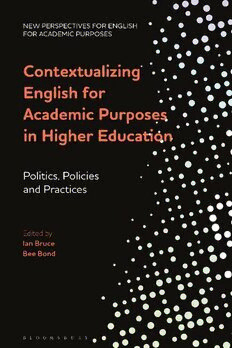
Contextualizing English for Academic Purposes in Higher Education: Politics, Policies and Practices PDF
235 Pages·2022·12.169 MB·English
Most books are stored in the elastic cloud where traffic is expensive. For this reason, we have a limit on daily download.
Preview Contextualizing English for Academic Purposes in Higher Education: Politics, Policies and Practices
Description:
This book highlights the centrality of political and ideological issues as they relate to the positioning and practice of English for Academic Purposes (EAP), demonstrating that EAP cannot flourish as a profession or a discipline without an awareness of the macro- and meso-level political shifts that impact the wider university. The volume states that the practices of EAP are, in fact, political acts and examines these as yet unexplored power dynamics.The volume begins by considering key influences that have shaped universities and their governance and management over the last three decades and how these relate to the role and practice of EAP. These influences include neoliberal economic policies, governmental demands for widening participation, globalization, entrepreneurial approaches to higher education, students as clients and therapeutism in universities. Following consideration of these broader contextual issues, specific chapters focus on politics and policies surrounding the recruitment and participation of international, fee-paying students, their positioning and identity within English-medium universities, including issues relating to English language, standards and academic integrity. Further chapters then consider more local influences that shape EAP programmes, such as their strategic roles within universities, their management, their teaching and wider academic impact.
See more
The list of books you might like
Most books are stored in the elastic cloud where traffic is expensive. For this reason, we have a limit on daily download.
